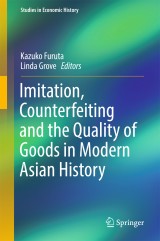Details

Imitation, Counterfeiting and the Quality of Goods in Modern Asian History
Studies in Economic History
|
139,09 € |
|
| Verlag: | Springer |
| Format: | |
| Veröffentl.: | 12.10.2017 |
| ISBN/EAN: | 9789811037528 |
| Sprache: | englisch |
Dieses eBook enthält ein Wasserzeichen.
Beschreibungen
<p>This book focuses on the production of low-quality goods, the rise of markets for imitations and shoddy goods, and dishonest trading practices which developed along with the expansion of global trade in the nineteenth and twentieth centuries in East Asia. Fake, imitation, counterfeit, and adulterated goods have long plagued domestic and international trade. While we are all familiar with contemporary attempts to control the manufacture and sales of such goods, economic historians have given the subject little attention, despite the fact that the growth of international trade and the lengthening of commodity chains played a major role in the spread of such practices. The problem is approached in several ways. Part I of the book examines the ways in which the asymmetry of product-quality information was reduced and mechanisms were developed to bring greater order in the markets, using case studies on cotton fiber, silk pongee, cotton cloth, fertilizer, and tea. Part II of the book focuses on problems associated with imported everyday-use items—which are referred to here as “small things”—and the role played by imitations of such everyday goods as soap, matches, glass bottles, and toys in the development of the modern economies of Japan, China and Taiwan. The project brings together the work of an international team of scholars who offer important historical perspectives on these issues, exploring the ways in which new institutions were created that continue to play a role in contemporary global economic activities.</p>
<p>Part I Governing the Quality of Goods: Information, Trust-building and the Self-enforcement Mechanisms of the Market.- 1 Asymmetry of Information, Trust-building and Market Quality: Governing the Quality of Goods in Modern Asia (Kazuko FURUTA and Toshiaki USHIJIMA).- 2 Market Approaches to Dealing with Cotton Adulteration in Early Twentieth Century China (Masataka SETOBAYASHI).- 3 Fraudulent Fertilizer Problem in the Late Meiji Era: Credibility Acquisition by New Market Entrants and the Agricultural Experiment Stations (Chikashi TAKAHASHI).- 4 Two Paths toward Raising Quality: Fertilizer Use in Rice and Sugarcane Cultivation in Colonial Taiwan (1895-1945) (Kensuke HIRAI).- 5 Quality as a Moving Target: Japanese Tea, Consumer Preference, and Federal Regulation on the US Market (Robert HELLYER).- 6 Merchant Association Networks and Product Quality Control: A Case Study of the Silk Pongee Industry in Shandong (Wei ZHANG).- 7 Imitation and Innovation in the Early 20th Century North China Weaving Industry (Linda GROVE).- Part II Small Things and Copy Culture in Global Economic History: From the Perspectives of East Asia.- 8 Imitation, Counterfeiting, and the Market in Early Twentieth Century Japan and China: Intra-Asian Trade in Modern Small Sundry Goods (Kazuko FURUTA).- 9 Technology Transfer, Imitation and Local Production: The Soap Industry in Early 20th Century Tianjin (Linda GROVE).- 10 Assimilation and Industrialization: The Demand for Soap in Colonial Taiwan (Kensuke HIRAI).- 11 Playing with “Alien Fire” (Yanghuo): Matches in Late-Nineteenth and Early-Twentieth Century China (Kai Yiu CHAN).- 12 From Emulation to Innovation: Japanese Toy Exports to High-income Countries before World War II (Masayuki TANIMOTO).- 13 Bottom-up Industrialization in the People’s Republic of China: A Case Study of Industries Producing Small Things in Zhejiang (Asei ITO).- Index.<</p>
<p>This book focuses on the production of low-quality goods, the rise of markets for imitations and shoddy goods, and dishonest trading practices which developed along with the expansion of global trade in the nineteenth and twentieth centuries in East Asia. Fake, imitation, counterfeit, and adulterated goods have long plagued domestic and international trade. While we are all familiar with contemporary attempts to control the manufacture and sales of such goods, economic historians have given the subject little attention, despite the fact that the growth of international trade and the lengthening of commodity chains played a major role in the spread of such practices. The problem is approached in several ways. Part I of the book examines the ways in which the asymmetry of product-quality information was reduced and mechanisms were developed to bring greater order in the markets, using case studies on cotton fiber, silk pongee, cotton cloth, fertilizer, and tea. Part II of the book focuses on problems associated with imported everyday-use items—which are referred to here as “small things”—and the role played by imitations of such everyday goods as soap, matches, glass bottles, and toys in the development of the modern economies of Japan, China and Taiwan. The project brings together the work of an international team of scholars who offer important historical perspectives on these issues, exploring the ways in which new institutions were created that continue to play a role in contemporary global economic activities.</p>
Is the first book in the economic history of Asia to focus on the ways in which deterioration of the quality of goods was countered and the quality of the markets maintained Provides rich historical case studies of how the asymmetry of product-quality information was reduced, with the help of the literature on the theory of market quality Includes studies on intra-Asian production and trade in small sundry copy-goods to aid in understanding and solving similar problems in contemporary developing countries Includes supplementary material: sn.pub/extras
Diese Produkte könnten Sie auch interessieren:

Supply Chain Management: Models, Applications, and Research Directions

von: Joseph Geunes, Panos M. Pardalos, H. Edwin Romeijn

149,79 €















